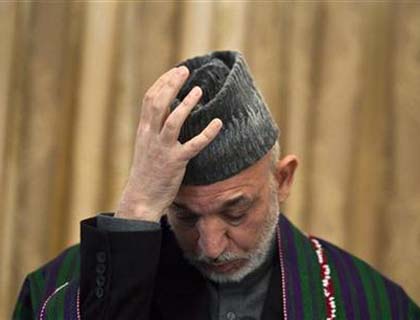Water in the ditch of Kabul of and Washington relationship is getting colder and colder and keeping swimming there is increasingly turning a bad idea. Its linkage has been caught of fresh water and, thus, it gets dustier. Recently, I have written extensively about Kabul and Washington relation and particularly Mr. President Karzia's new approach toward Afghan foreign allies. I strongly believe that the international communities' commitments and promises, though weakened, yet remained strong enough to continue for years. But in this site, the stance and approach of Kabul government has undergone to fundamental change, taken from one extreme to another——fully dependent into an endeavor complete independence.
I do not claim that sovereignty and more authorized central government is not good. Instead what I am trying to emphasize on is the consequence of statements and policies which further weakens the already delicate relationship between Kabul and international community in general and US in particular. In addition, I fear about the real intention behind those policies and remarks and strongly doubt about their capability to lead the country toward the intended, absolutely appreciating, goals and objectives.
Certainly no Afghan citizen may oppose the idea of having a strong, independent and authorized government which can cope with the situation without hearing nagging of foreign countries.
But there are necessary evils to be accepted. As Mr. President Obama while receiving the Noble Peace Prize for his decisions and efforts for global peace and fraternity, he said that Afghanistan and Iraq's were necessary evils.
The current circumstance in the country is similar. We are in need of foreign forces and we are in need of financial and diplomatic efforts, perhaps, for a long time. This is something that Afghan political and military experts maintain.
With all shortcomings of foreign allies in realizing their commitments and promises, yet they kept canal open for cash flows and military and diplomatic assistance, while their own economies have a hard time due to 2008 financial crisis and subsequent economic slowdown.
When they decided to scale down or suspend their donations was due to unrealized commitments of Afghan government. When Mr. Karzia won the second presidential election, he promised to fight corruption within his administration. But corruption has still largely prevalent and there are top corrupt officials that no one has the gut and power to persecute them. When the crisis broke out Kabul Bank, the biggest private commercial bank, international donors decided to suspend large part of their assistance because much of those donations were made through this bank.
Anyhow, it has become years that the stream of mistrust flows more then ever. The process started when President Karzia came to understand about his status among his foreign counterparts. Since then he is trying to seek recognition of foreign allies for his authority.
The relation between President Karzia and Afghan foreign allies has not been moving on a smooth track since the end of his first round tenure as President. But both sites were trying their best to keep secret the delicacy of bilateral relationship.
After the second presidential election, it emerged that how Mr. Karzia has lost foreign trust when foreign officials clearly blamed him of systematic electoral fraud. Thereafter, the relationship has not moved entirely back on smooth track. There are various issues on which Kabul government is in disagreement with foreign allies.
Mr. Karzia has always opposed night raids aimed and effective to bring down al-Qaeda and Taliban field commanders. Mr. President has been arguing that during night raids these Afghan innocents being targeted and victimized instead of Taliban and al-Qaeda elements. No doubt, occasionally those attacks have failed to achieve the intended result or held on the basis of false and inaccurate information which led to death of women and children. But absolutely all were not like that.
Many high commanders of Taliban and al-Qaeda have been killed who were quite important in militants' establishment. Such kind of operations are also so cheap for foreign forces as less combatant troops are required to perform the operations. And it also gives lesser maneuver for militants to revenge as they know nothing when and where they are going to be attacked.
Now it is not just night raids. There are several other issues that President Karzia wants to take the control. Negotiation with Taliban-led militants is one of the critical issues on which Kabul and Washington have different approach. As parts of Afghanization, Mr. President convinced international community that peace negotiation should be made under the leadership of Afghan government.
After a year of exhaustive struggle, it did not work out as Taliban leaders say they would talk with US not with Afghan government, the thing which seemingly Washington has accepted presently. But Mr. President resists against the motion and says that if government is sidestepped in the peace process, then peace would not last for a long time. He clearly opposed the opening of an office for Taliban in Qatar which challenged severely the measure of US to jump-start negotiation with militants.
The most recent controversial which now weigh on bilateral relation is American prison in Bagram airbase. Now he wants US to cede the Bagram Prison to Afghan government, where his assigned commission reported of abuses of prisoners. The New York times reported beautifully saying that the parts of prison which are under the control of American authorities there were not abuses, Instead abuses committed by Afghan authorities.
Anyhow, the head of commission has said that presence of foreign prison against constitution and national sovereignty. So, the question is: is the story the same with presence of foreign forces in the country? If having a prison is against national sovereignty then foreign combatant troops are definitely against national sovereignty. Should the foreign forces withdraw tomorrow in order to keep intact the national sovereignty? It is something that Mr. President has to answer?

